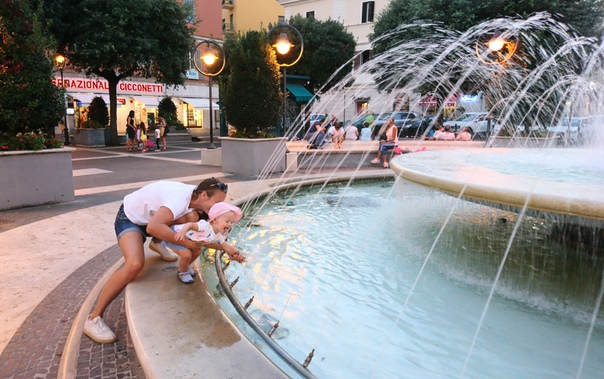Есть мнение, что в Италии не патриотичная молодёжь. Не любят свою страну, культуру, не смотрят своё кино, не слушают свою музыку, не читают своих книг. (А вообще это всё в Италии есть за последние пару десятков лет??? - Тото Кутуньо и Челентано не в счёт) Ещё молодёжь (в первую очередь подростки) невоспитанная, по моим наблюдениям, - коляске дорогу не уступают ни на улице, ни в вагоне метро - ну, то есть совсем не пройти иногда, никак. Чего нельзя сказать о пожилых итальянцах, очень вежливых и обходительных. (Однажды мы с Анюткой, пока ждали Серёжу, провожавшего маму в аэропорт, забрели в Риме на кладбище. Ненарочно. На карте гугл оно выглядело, как обычный римский парк при обычной римской вилле. Естественно, решили чуток прогуляться и, естественно, чуток заблудились. Встретили одинокого пенсионера, ухаживающего за могилой, почившей супруги, может быть. Не зная английского, он смог понять, что я ищу "ущита" ("выход") и почти проводил меня до него.)
Зато юные итальянцы, что называется, продвинутые. И дело не только в том, что они говорят по-английски на несколько порядков лучше своих "предков" (точнее говорят чаще, пенсионеры никак не говорят), они ещё чрезвычайно раскрепощены. Подросток, сидящий за соседним столиком в ресторане, может свободно сам заговорить с вами на том самом английском, чтобы объяснить недопонимание в общении с официантом. Подросток на пляже может невероятно пластично (у парня талант, ей-богу) пританцовывать под в мою юность популярные песенки Рикки Мартина и Шакиры, подмигивая моей дочери и подбадривая её не стесняться. А подросток на железнодорожной станции может включить на весь перрон (правда, там кроме нас никого не было) русскую песню "Катюша", услышав нашу русскую речь. А потом без стеснения вступить в диалог. (Оказалось, что его мать русская и он до 5 лет жил в России. Прояснил давно мучивший нас вопрос по итальянскому языку - отличие Un от Uno.)
Может быть, всё потому, что здесь детей с детства не подавляют или игнорируют, а, наоборот, всячески одаривают своим вниманием. (Речь о посторонних людях. У нас же не принято на улице разговаривать с чужими детьми или ими восхищаться - Чур меня-чур,тьфу-тьфу-тьфу и только бы не сглазили) ????????????????????
А фото так, на память. С мальчиком же вчера на жд не заселфились.
Зато юные итальянцы, что называется, продвинутые. И дело не только в том, что они говорят по-английски на несколько порядков лучше своих "предков" (точнее говорят чаще, пенсионеры никак не говорят), они ещё чрезвычайно раскрепощены. Подросток, сидящий за соседним столиком в ресторане, может свободно сам заговорить с вами на том самом английском, чтобы объяснить недопонимание в общении с официантом. Подросток на пляже может невероятно пластично (у парня талант, ей-богу) пританцовывать под в мою юность популярные песенки Рикки Мартина и Шакиры, подмигивая моей дочери и подбадривая её не стесняться. А подросток на железнодорожной станции может включить на весь перрон (правда, там кроме нас никого не было) русскую песню "Катюша", услышав нашу русскую речь. А потом без стеснения вступить в диалог. (Оказалось, что его мать русская и он до 5 лет жил в России. Прояснил давно мучивший нас вопрос по итальянскому языку - отличие Un от Uno.)
Может быть, всё потому, что здесь детей с детства не подавляют или игнорируют, а, наоборот, всячески одаривают своим вниманием. (Речь о посторонних людях. У нас же не принято на улице разговаривать с чужими детьми или ими восхищаться - Чур меня-чур,тьфу-тьфу-тьфу и только бы не сглазили) ????????????????????
А фото так, на память. С мальчиком же вчера на жд не заселфились.
There is an opinion that in Italy there are not patriotic young people. They do not like their country, culture, do not watch their movies, do not listen to their music, do not read their books. (In general, it’s all in Italy over the last couple of decades ??? - Toto Kutuno and Celentano do not count) Young people (especially teenagers) are ill-mannered, according to my observations, - the carriage is not inferior either on the street or in subway car - well, that is not to go at all sometimes, no way. What can be said about the elderly Italians, very polite and courteous. (Once, when we waited for Seryozha, who accompanied my mother to the airport, we wandered into Rome's cemetery in Rome. Not at all. On the Google map, it looked like an ordinary Roman park in an ordinary Roman villa. Of course, we decided to walk a bit and, of course, lost a bit. They met a lonely pensioner who was caring for the grave, a deceased spouse, maybe without knowing English, he was able to understand that I was looking for "protection" ("exit") and almost escorted me to him.)
But the young Italians, they say, are advanced. And the point is not only that they speak English by several orders of magnitude better than their “ancestors” (or rather, they say more often, pensioners do not speak at all), they are also extremely liberated. A teenager sitting at a nearby table in a restaurant can freely speak to you in that same English, in order to explain a misunderstanding in communication with the waiter. A teenager on the beach can incredibly plastically (the guy has talent, by golly) to dance under my youth the popular songs of Ricky Martin and Shakira, winking at my daughter and encouraging her not to be shy. And a teenager at the railway station can turn on the whole platform (although there was no one there except us) the Russian song Katyusha, having heard our Russian speech. And then without embarrassment enter into a dialogue. (It turned out that his mother was Russian and he lived in Russia for up to 5 years. He clarified the Italian language question that had long tormented us - Un's difference from Uno.)
Perhaps, all because here children since childhood are not suppressed or ignored, but, on the contrary, in every possible way give their attention. (Speech about strangers. But it’s not customary on the street to talk with or to admire other people's children - Chur me, mind you, pah-pah-pah, and just wouldn’t jinx it) ?????????????? ???????
And so the photo, as a keepsake. With the boy yesterday, the railway did not get stuck.
But the young Italians, they say, are advanced. And the point is not only that they speak English by several orders of magnitude better than their “ancestors” (or rather, they say more often, pensioners do not speak at all), they are also extremely liberated. A teenager sitting at a nearby table in a restaurant can freely speak to you in that same English, in order to explain a misunderstanding in communication with the waiter. A teenager on the beach can incredibly plastically (the guy has talent, by golly) to dance under my youth the popular songs of Ricky Martin and Shakira, winking at my daughter and encouraging her not to be shy. And a teenager at the railway station can turn on the whole platform (although there was no one there except us) the Russian song Katyusha, having heard our Russian speech. And then without embarrassment enter into a dialogue. (It turned out that his mother was Russian and he lived in Russia for up to 5 years. He clarified the Italian language question that had long tormented us - Un's difference from Uno.)
Perhaps, all because here children since childhood are not suppressed or ignored, but, on the contrary, in every possible way give their attention. (Speech about strangers. But it’s not customary on the street to talk with or to admire other people's children - Chur me, mind you, pah-pah-pah, and just wouldn’t jinx it) ?????????????? ???????
And so the photo, as a keepsake. With the boy yesterday, the railway did not get stuck.

У записи 13 лайков,
0 репостов,
481 просмотров.
0 репостов,
481 просмотров.
Эту запись оставил(а) на своей стене Татьяна Коновалова


































